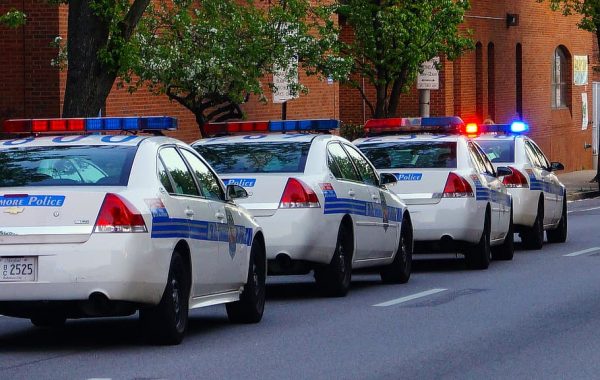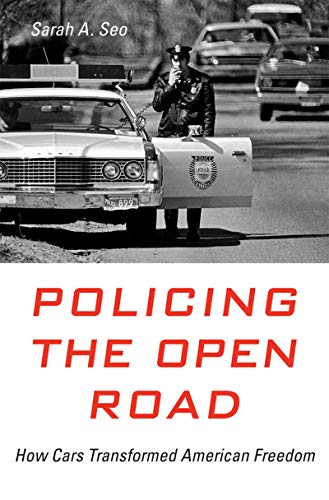On July 10th, 2015, a police officer in Prairie View Texas pulled over a 28-year-old black woman named Sandra Bland for not signaling before a turn. The traffic stop quickly turned hostile and there was a confrontation between the officer about her smoking in her car. Many people have probably seen the footage of this arrest. It’s pretty disturbing. The officer drags Bland out of the car and threatens her with a taser. He then arrests her and takes her to jail where she tragically dies three days later. Bland’s death was ruled a suicide, but her treatment at the hands of the police sparked outrage across the country.
Sarah Seo’s recent book is called Policing the Open Road: How Cars Transformed American Freedom, And it’s basically a historical analysis of how we got into this situation—where police have so much power over people in their cars, where black and brown people are stopped and searched disproportionately, and where a minor traffic violation like failing to use a turn signal can have deadly consequences. Seo brilliantly connects the history of modern policing with the history of the car. Policing the Open Road is an important book for this moment and Roman Mars wanted to talk with Professor Seo about it. We started 100 years ago, at the dawn of the automotive age.





Comments (6)
Share
I gotta say, Sarah completely ignores he fact that there were many many thousands of people riding bicycles at the turn of the century before motor-vehicles displaced and killed them off. The book “Roads Were Not Built For Cars” by Carlton Reid 2015 is a must-read on this topic.
It is a tragedy that someone gets pulled over for a small infraction and it escalates and racism/discrimination has no place in our society. However, the rules and regulations for motorists are there for a reason, and especially when a cyclist is riding and someone doesn’t signal it can mean life or death. I have a broken neck (now a titanium neck) specifically because a motorist failed to signal their turn.
Motor vehicles weigh many many thousands of pounds and cause immense death and destruction each year for tens of thousands of humans.
I have a car, don’t get me wrong, but the way that many people drive flippantly and with utter disregard for human life and vulnerable road users astounds me. Many act as tho it’s a “GOD” given right to operate a motor vehicle, when it’s merely a privilege they are able to enjoy and pay for as long as they follow the rules.
The bicycle is The Answer; to the environment, to traffic, to fitness and health and on and on and on.
I agree, and regardless of my personal bias, several times in this episode I wondered why decisions were made, and they weren’t really addressed. It felt like my opinion “had” to be this, and to keep moving on with this narrative. Not the most balanced episode.
I found the piece provocative because of the impact of the vehicle…on the Courts/Law, once they made that first ruling, and then it led to more rulings. What a great addition to the 99% Inv library! And the follow on piece about Berkley. Thats really thinking outside the box. Taking a chance. I see issues with high speed cars potentially causing mayhem and loss of life needing to be chased by…who? But I bet they’ll figure it out.
I too found it telling how readily we accepted policing as a “solution” to reckless driving, rather than pursuing thorough driver education and actually making sure people handle their cars with serious care.
Implicitly, this says that cars are actually extremely difficult to handle with care if so many “good citizens” are regularly making hazardous infractions. Cars are massive, easily lethal vehicles, and yet we treat them so casually as if they’re a simple household appliance. And meanwhile every bit of marketing around them teaches us to push cars to their limits, to own the road, to drive aggressively.
How exactly are you a “good citizen” if you blow off these risks? What a flawed fundamental reason for an extraordinarily harmful system.
I was pulled over about 15 years ago and arrested. My car was taken and and a slew of officers- both black and white-were on hand and abused their power over me. My crime? Running a red light (they finally told me after I was cuffed and my car was getting towed and I was taken to the station). My real crime? Making officers feel foolish and upsetting them.
What I did not realize at the time was how frightened officers are and how misaplied training can g horribly wrong as in the tragic case of Sandra Bland, may she rest in peace and her arrest and death be lesson to us all.
I love 99PI. For a very good podcast you told a one sided story. For a more complete understanding of policing and the Sandra Bland case and an understanding of our current state of unrest please read Malcolm Gladwell’s book – “Talking To Strangers” It helped me come to peace over a decade later with what happened to me that night, scared and overwhelmed by 5 cops. It will not only bend your mind but also explain the design of “Kansas City” style policing, the flaws and the merrits.
This episode was so interesting that I felt compelled to revisit it a year later. I’m not sure if Roman and his expert team of beautiful nerds are in the habit of providing updates on their stories, but one year in, I’d love to hear how Berkeley is faring with its new traffic enforcement paradigm. Is it working? Has it been revised? dismantled?
Other commenters here mention that bicycle safety was overlooked in this episode. I felt that the real crux of the story was about legal vs. illegal search and seizure and the broad legal ramifications of the policing of automobile traffic violations. Cycling is super important, yes….and I say that as an avid cyclist (who also owns a car). Hopefully any update about Berkeley’s new BerkDOT could also include how cycling is included in the overall traffic safety plan for that fine city.
Thank you for continually helping me learn so much about the world around me, 99 PI. 😊